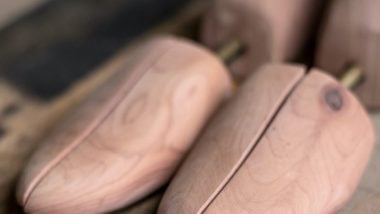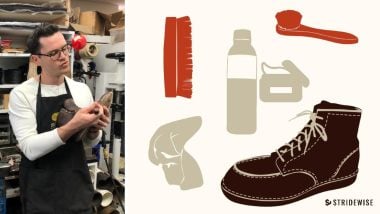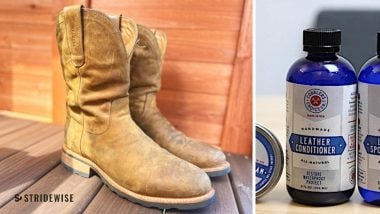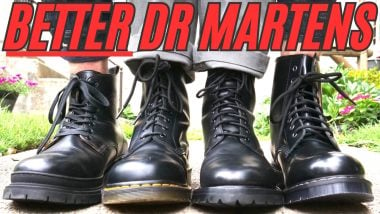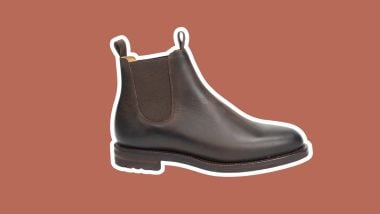How to Get Smells Out of Work Boot Smell | 18 Tips to Keep Your Boots Fresh
If you are on your feet all day engaged in hard manual labor, smelly work boots are a fact of life. It’s always a welcome relief to take off your work boots at the end of the day… the unpleasant smell, not so much.
However, we have curated 18 great ways to keep your boots smelling fresh. Having to put up with smelly work boots needn’t be a necessary evil and with our top tips to prevent smelly boots, you will never have to worry again about what you unleash when you untie your laces.
How to banish smelly work boots forever
In this ultimate guide to banishing offensive boot smell, we discuss stopping unpleasant odor caused by excessive sweating, the various ways to consign your stinky boots and sweaty feet to the past, and some great hacks to eliminate odor and bad smells usually associated with leather boots. In total, we have arrived at 18 top tips for keeping work boots, including steel toe boots, smelling like a fresh pair you newly bought.
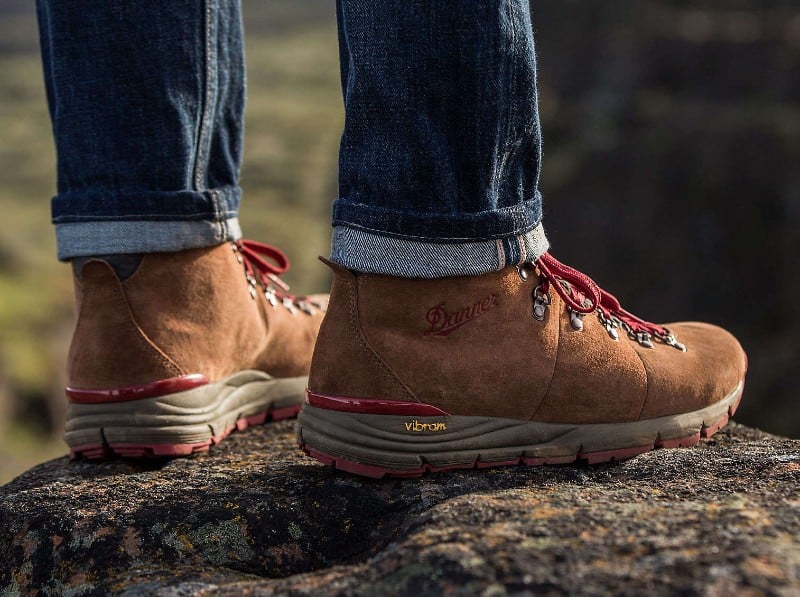
Tip No. 1 – Wear socks!
Wear a fresh pair of cotton socks daily. You will never remove boot odor wearing the same socks: they are a breeding ground for smells, especially in extreme temperatures. Wash your socks in warm water by hand or in a washing machine, and leave them to dry overnight. You can wear moisture wicking socks. Also popular these days are bamboo socks.
Learn more in our guide to the best boot socks.
Tip No. 2 – Dry out leather boots between wears
Due to all the sweat inside, your boots get wet every day. It is essential, therefore, to dry your boot overnight. This is why it’s generally recommended to own more than one pair of boots: giving them a day to rest between wears helps to improve their longevity. Even if you haven’t gotten them wet, using cedar shoe trees helps to handle the humidity that has developed inside the boots from a day of wear. Have they actually gotten wet? Read our guide to drying out work boots.
Tip No.3 – Clean your feet
If you wish to retain that new boots smell, start with your feet. Give your feet a thorough wash every day, as this helps remove dead skin and any remaining foot odor-causing bacteria. Next, use anti bacterial soap and apply deodorant before putting on fresh socks.
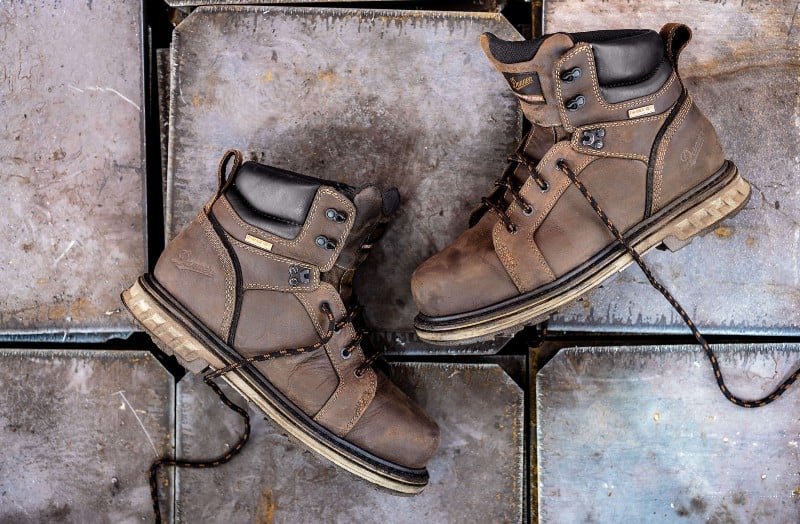
Tip No. 4 – Buy work boots and steel toe boots that allow proper ventilation
For unusually smelly feet, it’s a good idea to avoid waterproof boots and boots that don’t breathe well. Always choose footwear that allows for air circulation, with additions like Space Air Mesh or ventilating holes. It is less likely your feet will sweat as a result.
Tip No.5 – Buy socks with moisture-wicking properties
There are several socks available in the market that are designed with wicking properties to absorb moisture. Usually, they are made from cotton or merino wool. These socks draw the sweat away from your feet and will keep your work boots emitting nothing but pleasant scents.
Tip No. 6 – Soak your feet to keep the bad smell at bay
Using a foot soak will help keep your feet odor-free. Just add two to three spoons of foot soak into a basin of water, pop in your size nines, and relax. A foot soak is blissful and useful if you have smelly feet or an infected foot injury. The formulations for foot soak products are specially designed to kill fungus, bacteria, and unpleasant foot odors. If you don’t have the time, use rubbing alcohol instead.
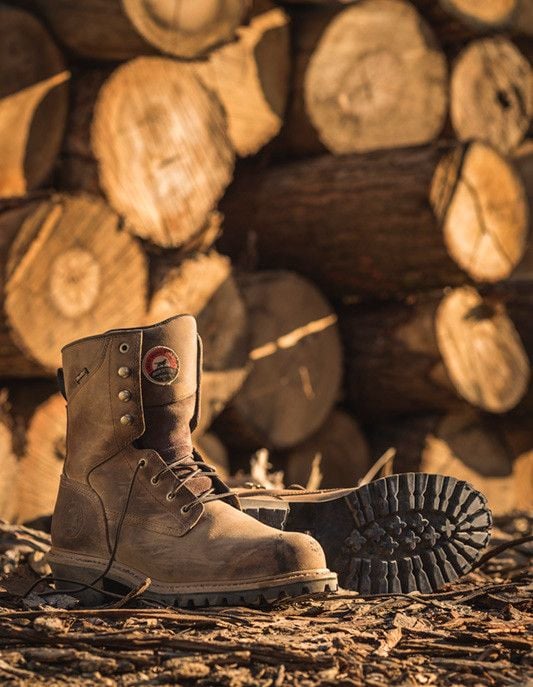
Tip No. 7 – Clean smelly work boots
Don’t have a library of boot cleaning products on hand? Baking soda works wonders for your feet and footwear. Try the following:
- Take a handful of baking soda and pour it into a clean pair of socks
- Insert the socks inside your boots for a few hours or, better still, leave them overnight
You will notice a big difference smell-wise the next morning. Alternatively, you pour the baking soda directly into your boots. Getting rid of excessive powder can be difficult, so you may prefer to use baby powder instead. You can even use cat litter.
Tip No. 8 – A few drops of essential oil
A few droplets of essential oil, like tea tree oil, inside your boots before and after you wear them will be a big help. Essential oils act as a natural deodorizer and stop any build-up of nasty aroma.
Tip No. 9 – Put teabags in your boots!
Teabags, believe it or not, are yet another way to remove odor. Instead of binning your used teabag, pop it into a boot. However, remember to remove it and ensure your boots dry out afterward. You can speed up the process with a hairdryer if you have one available.
Tip No. 10 – DIY lemon spray
Another hack worth knowing is DIY lemon spray, which you can make as follows:
- Squeeze a lemon into some water and add the peel as well
- Add a few drops of essential oil
- Add two tablespoons of vinegar
- Pour the mix into a clean spray bottle
- Spray the insides of your boots and leave for a few hours
- Dry with a hairdryer
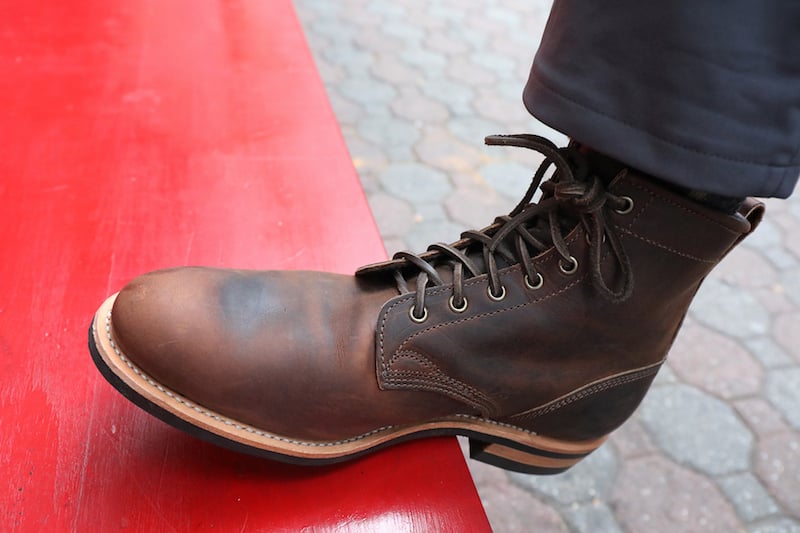
Tip No. 11 – Pop dryer sheets into your boots
Dryer sheets are another weapon to combat noxious fumes. Insert them in the boots and then sprinkle talcum onto the dryer sheets. You can now be a confident boot-wearer as the dryer sheets are great at absorbing sweat and preventing odor build-up. Remove the sheets at the end of the day and replace them with new ones before wearing your boots again.
Tip No. 12. – Buy boots with non-metallic toe caps
Select boots with non-metal safety toes. There are plenty available nowadays, like Irish Setter. The big benefit is that, unlike steel toe caps, they do not conduct heat and won’t overheat your feet.
Tip No. 13 – Treat yourself to a boot dryer
This might sound extravagant, but a boot dryer is a cure if footwear fumes give you a headache. You pick up one that dries and deodorizes for less than $20, though those tend to take may hours to dry the boots — with a budget of $60, you can get one that dries them in under three hours.
Dryers run pretty much silently and can get the job done in hours. They are excellent for eliminating moisture, preventing mold and mildew, and preserving your gear.
Tip No. 14 – Stow your boots correctly
Storing boots correctly is a must. Once you take them off and run through some of our top tips above, it’s crucial to store your boots in a well-ventilated space that’s light and airy. Avoid dark and damp storage places as this is the environment in which odor-causing bacteria like to thrive.
Tip No. 15 – The weekend is for keeping boots clean
Weekends were custom-built for cleaning work boots. In addition, there are several regular household items, including baby powder, that you can use to clean and deodorize your footwear.
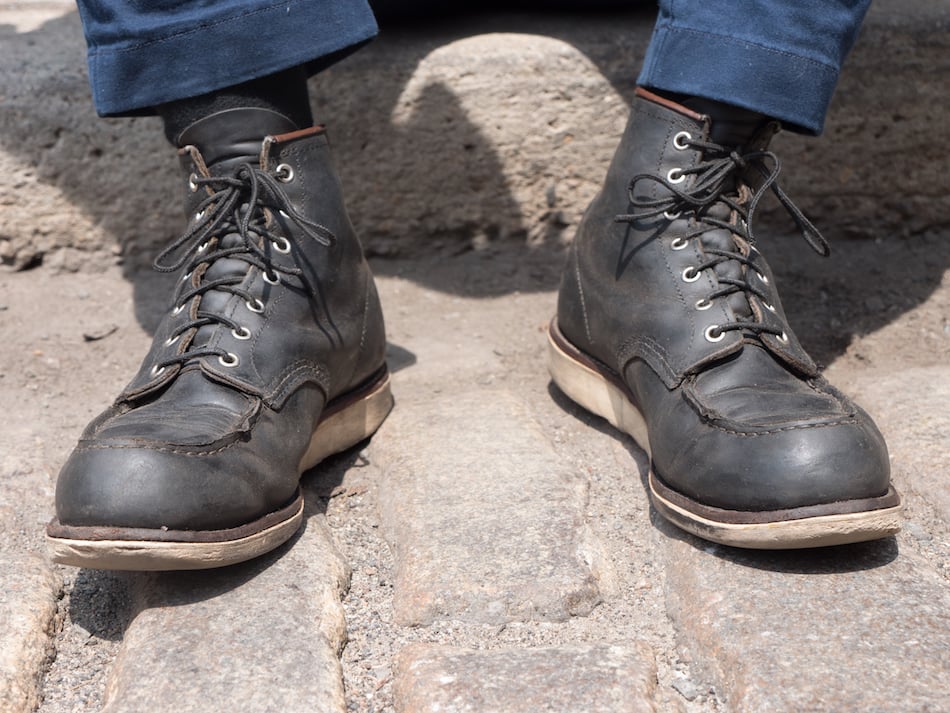
Tip No. 16 – Placing lemon peels in your footwear
Use lemon peels to eliminate sweaty smells. Leave them inside your work boots overnight for best results.
Tip No. 17 – Sprinkle talcum powder
One of the easiest life hacks is using baby powder to soak up the sweat and improve the fragrance. If you have none to hand, you can substitute with fresh cat litter instead.
Tip No. 18 – Spray alcohol for its antibacterial properties
For this, you need to add equal amounts of alcohol and water together. Put the mixture in a clean spray bottle and spray liberally inside your offensive footwear. You can place them overnight under a fan if you wish. This spray works as the alcohol evaporates and draws with it your foul feet smells.
What makes work boots smell so bad?
The main reason is the thick lining and cushion insoles you find in work boots. Though designed to keep your feet warm and comfortable in winter, they can be somewhat of a sweaty nightmare during the summer. As feet have multiple sweat glands, when they become overheated, the sweat clogs your pores. Courtesy of bacteria, this eventually turns into a bad odor.
But that’s just part of the story; there are several other causes of bad odor.
1) Waterproofing
If you want to keep water out, this, by definition, means that moisture inside can’t escape. Waterproof footwear means sweat is trapped, and this leads to those awful stomach-churning odors.
2) Thick Insoles
The trade-off for comfort is heat build-up. Thick insoles make feet comfy, but they will, in time, make your feet hot, causing smelly boots.
3) Leather
Most work footwear is made of leather. Unfortunately, leather tends to heat up, particularly in strong sunlight. So you can guess the rest.

4) Thick Socks
Work boot-wearing people tend to wear thick socks to keep their feet comfortable. But the usual outcome is that their feet overheat and start to sweat profusely. Eventually, they become very smelly. This effect can be limited by getting wool or cotton socks instead of the artificial stuff.
5) Steel toe caps
Steel is an excellent conductor of extreme temperature, both hot and cold. Unless steel toe boots are mandatory, consider changing to a non-metallic alternative.
6) Sweaty Feet
Some people have sweatier feet than others. If this is you, buy breathable footwear, for example avoid leather lining and GoreTex or other waterproof materials because they trap in heat and will exacerbate the smellyness.
How do you kill bacteria?
Bacteria feeding on your sweat is the culprit behind the rank smells. But you can stop the bacteria in its tracks by placing the following inside your footwear:
- Teabags contain anti-bacterial tannins and help destroy bacteria after being soaked in boiling water for several minutes.
- Cloves, too, placed inside overnight will also kill bacteria.
- Alternatively, you could place boots in a plastic bag and then put them in a freezer overnight to kill the bacteria.
- Retrieve them at least an hour before you need to wear them and place them in direct sunlight to thaw out. Your footwear will never smell fresher.
- A 50:50 alcohol spray
- Wash the insides with a soapy water solution.
Final thoughts on how to get rid of that work boot smell
By now, you will know what’s necessary to get rid of all the bacteria inside your smelly work boots. But equally as important, as we have seen, is the need for good daily foot hygiene. By keeping your feet clean and your boots, they will look after you.
Will putting my shoes in the freezer kill the terrible smell?
Yes, putting any foul-smelling footwear into a plastic bag and placing them in the freezer is an excellent solution. Bacteria that cause nasty odors cannot survive well in these low temperatures, so you will kill the smell as well as the bacteria.
Is it true teabags are good for smelly shoes?
Yes, the old teabag trick is trusted by many to shift smells from sweaty work boots. The reason being that the tannins you find in teabags are anti-bacterial and work by killing off the lurking bacteria that generate the noxious smells. Let the tea bags infuse in boiling water for three to ten minutes. (Just make a cup of tea, in other words.) Then squeeze out the water and place them inside the offending footwear until the next day to enjoy a fresher pair of shoes.
Why do shoes still smell after washing?
Your shoes can still smell after you wash them because they are not dried out properly. If you wash shoes, you have to ensure they don't lie around for a long time. If they are not properly dried and aired, they will continue to smell. Boot dryers are ideal, but you can improvise by using a hair dryer or placing the shoes near a fan.
Will baking soda remove the smell from shoes?
Yes, it's arguably one of the most efficient ways of removing footwear smells overnight. The soda, as well as being handy for baking, is a natural deodorizer and is great for neutralizing pungent smells inside the boots. There are two methods. Firstly, mix equal amounts of baking soda and corn starch and then sprinkle the resulting mixture inside your footwear. Leave overnight. The next step is to use a cotton swab or tissue to mop up the mixture before putting on your shoes or boots. The other method is to pour the baking soda straight into a clean pair of socks and tie a knot to seal it inside. Then place a sock in each of your boots and get rid of the smell easily.

